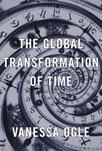Vanessa Ogle
Associate Professor of History; Senior Essay Director, History
Office:
HQ 264
Phone:
203-432-7304
Office Hours:
By appointment
Fields of interest:
Economic history; history of capitalism; political economy; modern European history; global and intl. history; comparative empires and decolonization
Bio:
I am a historian of global Europe from the 18th century to the present, focusing on the history of capitalism, economic history, and empire in global and comparative perspective. While my particular interests lie in Western Europe (Britain, Germany, Switzerland, France mostly), I conceive of Europe broadly and seek to place European history in the context of its interactions with the wider world. Before coming to Yale University, I was a faculty member at the University of Pennsylvania and UC Berkeley.
I am currently completing a book on the history of offshore capitalism from the late 19th century to the present. Offshore: A Global History of Havens (to be published with Viking in the US and Allen Lane in the UK), reopens the history of twentieth-century political economy and capitalism by excavating an economic, legal, and political regime of smaller, often enclave-like territories and spaces that thrived on the sidelines of a world otherwise increasingly dominated by nation-states. For the first time, Offshore comprehensively tells the story of how these evasion havens were made and why, who benefitted from these enclaves, and what this tells us about global capitalism in the 20th and 21st century. The project is based on several years of painstaking archival research combining documents from over 30 national archives, central banks, multilateral institutions, private banks, and oral history interviews in locations such as Australia, Bahamas, Britain, Canada, Cayman Islands, France, Germany, Ireland, Jersey, Luxembourg, Switzerland, and the US.
My first book, The Global Transformation of Time: 1870-1950 (Harvard University Press), explored the history of globalization, tracing changing political, economic, and legal regimes of time during an area of intensified interactions between Europe and other world regions. The book follows time in its different manifestations as social and economic clock time and calendar time from Germany, France, and Britain to British India, the colonial world broadly, the late Ottoman Levant and Egypt, and the League of Nations. The Global Transformation of Time received three awards, including the George Louis Beer Prize from the American Historical Association.
My work has been supported by fellowships from the ACLS, the Institute for Advanced Study – Princeton, the Institute for New Economic Thinking (INET), the Leverhulme Foundation (UK), a New Directions Fellowship from the Mellon Foundation, the NEH, the Shelby Cullom Davis Center (Princeton University), among others. I have held visiting professorships at King’s College London and the University of Sydney. In 2022, I was the recipient of a Max Planck – Humboldt Medal in the humanities and social sciences, given every three years to up to two researchers outside Germany whose past innovative research promises future breakthroughs.
Book:
The Global Transformation of Time: 1870–1950 (Harvard University Press, 2015)
AHA George Louis Beer Prize
Berkshire Conference Prize for best first book by a woman
Social Science History Association Award best first book manuscript
Selected Essays, Articles:
“The Dirty Gold Rush,” New York Review of Books, Feb. 1, 2025 (ca. 3,600 words)
“Noblesse Without Oblige,” Dissent, Winter 2025 (ca. 2,600 words)
“In the Zone of the Rich,” The Nation, Nov. 26, 2024 (ca. 3,200 words)
“Shipping’s Shadow World,” New York Review of Books, April 9, 2024 (ca. 3,604 words)
“Governing Global Tax Dodgers: The ‘Group of Four’s Attempts to Curb Multinational Tax Avoidance 1970-1980s,” Business History Review 97, no. 3 (2023): 547-574
“Narratives of Development and Growth,” Journal of Modern European History 21, vol. 4 (Nov. 2023).
Review essay as part of H-Diplo roundtable on Jamie Martin, The Meddlers, ca. 2,700 words, June 2023
“Decolonizing Britain: An Exchange,” with Erik Linstrum, Stuard Ward, Vanessa Ogle, Saima Nasar, Priyamveda Gopal,” Twentieth Century British History 33 (July 2022), 274-303
“Global Capitalist Infrastructure and U.S. Power,” Cambridge History of America and the World, ed. Mark Bradley, vol. 4: The Twentieth Century, eds. David Engerman, Max Paul Friedman, Melani McAlister, 31-54
“‘Funk Money’: The End of Empires, the Expansion of Tax havens, and Decolonisation as an Economic and Financial Event,” Past & Present 249, no. 1 (2020), 213-249
“Time, Temporality and the History of Capitalism,” Past & Present 243, no. 1 (2019): 312-327
“Archipelago Capitalism: Tax Havens, Offshore Money, and the State, 1950s-1970s,” American Historical Review 122, No. 5 (2017): 1431-1458
SHAFR Bernath Prize for best article on the history of US foreign relations, 2018
Berkshire Conference of Women Historians Prize for best article on any topic, 2018
“State Rights against Private Capital: The “New International Economic Order” and the Struggle over Aid, Trade, and Foreign Investment, 1962-1980,” Humanity 5 no. 2 (2014): 211-234
“Whose Time Is It? The Pluralization of Time and the Global Condition, 1870s-1940s,” American Historical Review 120, no. 5 (2013): 1376-1402
Best Article Prize, Council for European Studies, 2014
Period:
Modern
Recent
Geography:
Britain
Eastern Europe
Global/International
Mediterranean
Middle East
US
Thematic:
Comparative
Economic
Empires & Colonialism
Environmental
Legal
Political
Social
War & Society

